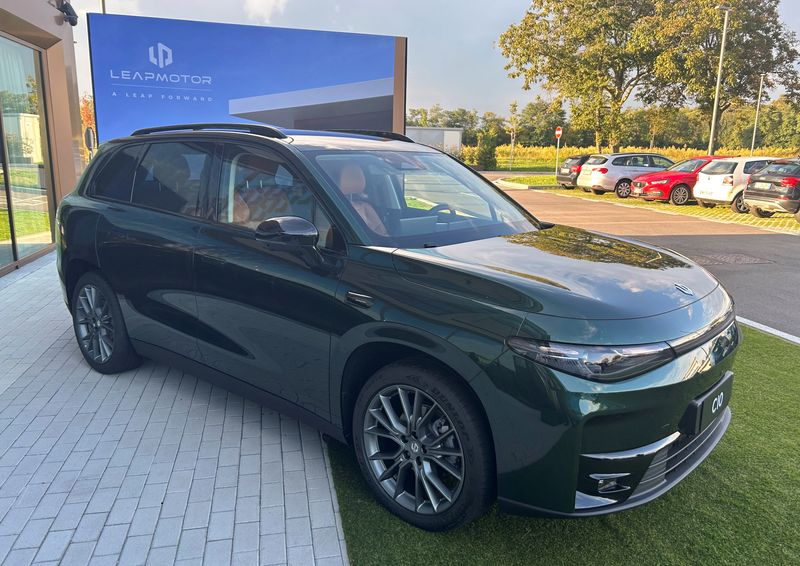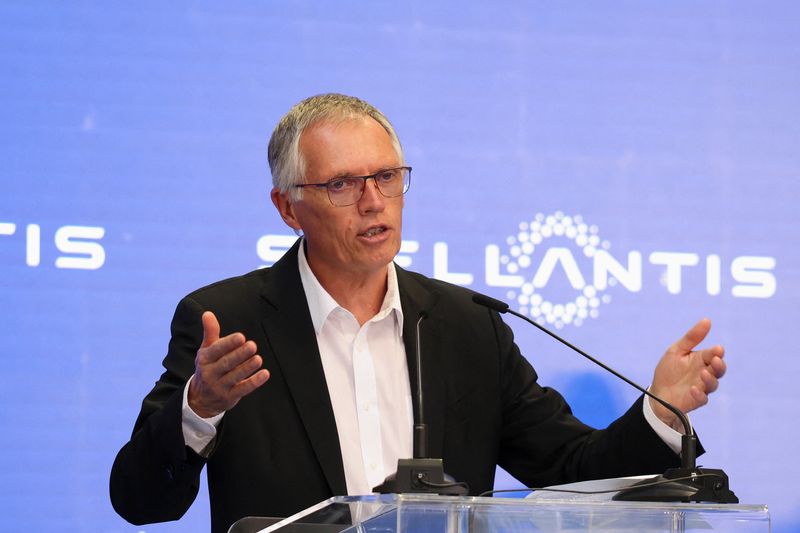By Nick Carey, Nora Eckert and Joseph White
LONDON/DETROIT (Reuters) - Stellantis (NYSE:STLA) wants to adopt the low-cost mindset of Chinese EV makers despite the European and U.S. tariffs CEO Carlos Tavares lambasts as anticompetitive, but the world's No. 4 automaker must navigate trade barriers on both sides of the Atlantic if it wants to succeed.
Tavares calls tariffs a "trap," arguing they will hurt legacy automakers by shielding them from the reality that Chinese rivals make electric vehicles for about a third less.
The best way to compete is instead to "try to be Chinese ourselves," Tavares said at a Reuters Events conference in Munich in May.
That belief led Stellantis to purchase a 21% stake in China EV maker Leapmotor (HK:9863) last October, creating a joint venture giving Stellantis access to Leapmotor technology and exclusive rights to produce its EVs outside of China.
The challenges faced by Stellantis in the EU and the U.S. are no different than those confronting all automakers as they seek to compete with the Chinese globally. However, Stellantis and a handful of others have taken it a step further, establishing partnerships with Chinese automakers in order to stay competitive.
Stellantis is making Leapmotor EVs at its Tychy plant in Poland alongside models from better-known brands Fiat, Jeep and Alfa Romeo.
Tavares says Stellantis could make Leapmotor EVs in North America.
But applying the same strategy in Europe and the U.S. is difficult because the regions have sharply different approaches to Chinese EVs and the underlying technology.
Chinese EVs are already on sale in Europe; and factories to make more are being built - with subsidies from individual countries competing for plants.
European automakers are embracing Chinese technology. Volkswagen (ETR:VOWG_p) has bought a stake in China's Xpeng (NYSE:XPEV) to jointly develop cheaper EVs for the Chinese market.
Many auto experts see this as a blueprint for future partnerships.
"We believe many of our competitors will turn to Chinese companies ... to use their platform globally," Ford (NYSE:F) CEO Jim Farley said in July, adding the U.S. automaker will develop its own core EV technology instead.
Such partnerships are far more challenging in the United States. The Biden administration has slapped a 100% tariff on Chinese-made EVs, championed U.S. production through the $430 billion Inflation Reduction Act and targeted Chinese car components.
The U.S government now proposes barring Chinese software and hardware from vehicles on American roads, which could be its most powerful weapon yet to block Chinese EVs.
Stellantis could theoretically produce Leapmotor EVs at U.S. plants, but with non-Chinese parts and U.S. wages any savings could be minimal.
The real problem for Stellantis would be political.
For instance, U.S. Republican Senator Marco Rubio and others have fiercely criticized a planned Ford battery plant in Michigan using technology licensed from Chinese company CATL.
Stellantis' contrasting U.S. and European options highlight differences in trade strategies on both sides of the Atlantic.
Protectionist moves have divided automakers and executives, with some, like Tavares, rejecting the need for tariffs, especially German automakers reliant on China for profits.
BMW (ETR:BMWG) CEO Oliver Zipse argues that as China dominates EV raw materials and components, a trade war would hurt Europe.
"There is no Green Deal in Europe without resources from China," Zipse said in May.
But some U.S. automakers favor tariffs.
Ford's Farley says tariffs level the playing field, giving U.S. automakers a short window to match Chinese rivals' ability to make cheaper EVs.
Industry observers say regardless of tariffs, China's EV industry will become a global powerhouse.
'GIVE THEM TIME'
U.S. executives said two European Commission reports released this year - detailing Chinese government assistance including direct EV purchase subsidies, cheap corporate loans, cheap electricity, and cheap or even free land - prove protection is needed.
Chinese companies dominate raw materials from rare earths to graphite, undercutting Western rivals on price.
In June, the U.S. government reinstated a 25% tariff on Chinese artificial and natural graphite.
"As long as the market stays unbalanced ... tariffs should stay in place," said Chris Burns, CEO of battery materials company Novonix, which has received $203 million in U.S. grants and tax credits to scale up synthetic graphite anode production at a Tennessee plant.
Detroit's automakers also need better EV models to compete, said Tim Piechowski, portfolio manager at ACR Alpine Capital Research, a General Motors (NYSE:GM) investor.
"This (tariffs) does give them time," Piechowski said.
'CARROT AND STICK'
The EU has proposed tariffs of up to 35.3%, but cannot shut out Chinese automakers because the 27-country bloc has a common set of rules for members and outsiders to play by.
"The aim is to remain open to competition from China, but on fair terms," a European Commission spokesperson said.
Andy Palmer, former COO of Nissan (OTC:NSANY) and currently chairman of Slovak battery maker InoBat, part-owned by China's Gotion High-tech, said the EU must rely on a "combination of carrot and stick to bring the Chinese in, so at least they're making locally."
Stellantis' Tavares says tariffs hurt exports because protected automakers are under no pressure to lower prices.
"When you get used to protection, it's very difficult to get rid of," Tavares told Reuters in May.
Stellantis is instead leaning on cheaper models like its upcoming Citroen e-C3, which will start at 20,000 euros ($21,342), and its Leapmotor EVs to compete.
A number of automakers have backpedaled on electrification targets, but Stellantis said its targets of 100% EV sales in Europe and 50% in the U.S. by 2030 remain in place.

Moshiel Biton, CEO of Israeli battery materials company Addionics, which plans a $400 million U.S. factory for cathode materials, said legacy automakers must develop better EVs to compete instead of simply embracing Chinese technology.
"If they just try to do copy and paste, they can't compete with the Chinese on cost," Biton said. "Innovation is mandatory or they face a dead end."
